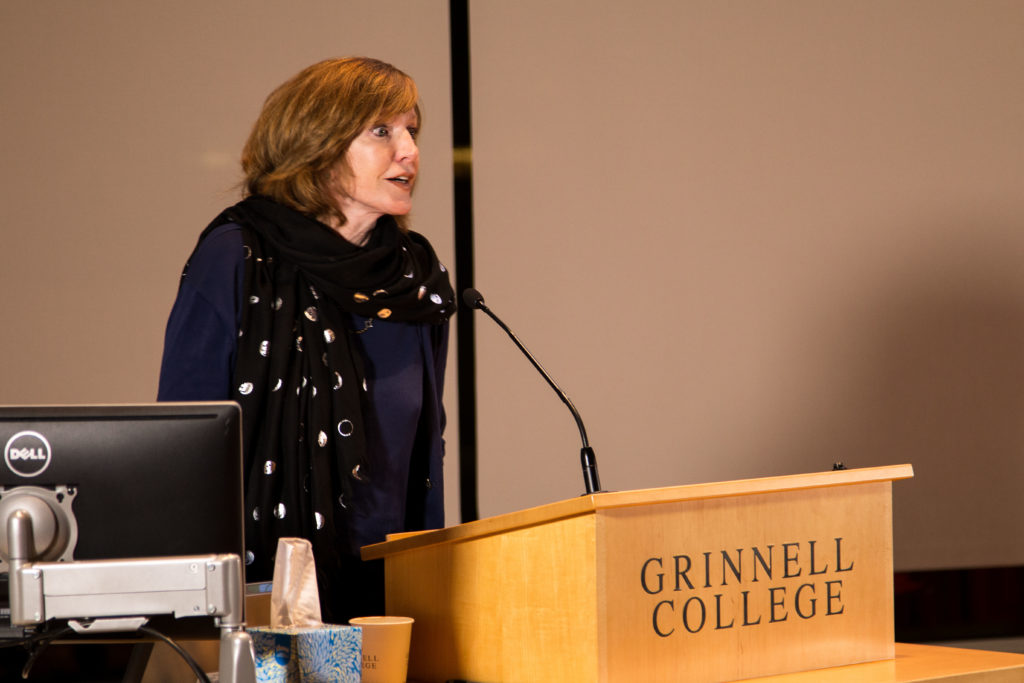
On Monday, Nov. 6 and Tuesday, Nov. 7, the Fossil Fuels and Climate Impact Task Force held the last of three rounds of community dialogues on divestment and carbon footprint reduction that have occurred this semester. The goals of this week’s campus wide dialogue series were “open, transparent and participatory,” as described by Kathryn Mohrman ’67, a member of the task force.
These three major principles do take a specific form in the task force’s current practices, as elaborated upon by Michael Kahn ’74, chair of the task force. “[Our goals include] recommending meaningful actions Grinnell College can take to positively impact climate, including consideration of fossil fuel divestment, taking a very broad approach that will consider our curriculum, our campus carbon footprint and our use of capital,” Kahn wrote in an email to The S&B.
In order to achieve these goals, the task force, composed of Kahn, Mohrman and Ed Senn ’79, has worked in conjunction with an advisory committee of students and faculty to host three rounds of dialogue on campus throughout the semester. These dialogues have focused on the College’s fossil fuel usage and climate impact.
This week’s set of dialogues involved the task force, the advisory committee, students, faculty and the Grinnell community at large. The Grinnell College website explained that these talks focused on “[d]ivestment decisions by other colleges, reducing the College’s carbon footprint, providing more curricular support and exploring sustainability efforts.”
Discussions varied from the importance of partnerships in divestment and how other colleges have gone about divestment, to alternate renewable energy options and Grinnell’s own sustainability plan. Student activist groups also held demonstrations in the Joe Rosenfield Center (JRC) over the course of the two-day event, calling on the College to divest from the fossil fuels industry.
The dialogue series was kicked off on Monday morning with a video conference call by activist Matt Remle, who spoke on his involvement with the Standing Rock movement and his work with the city of Seattle’s own divestment. When it became known in 2016 that Wells Fargo supported the Keystone Pipeline, Remle urged the city of Seattle to pull out of their contract with Wells Fargo and explore alternate banking options. Remle centered his story around his reliance on partnerships to implement change.
Remle’s talk was followed by a presentation on Monday evening by Rick Lancaster ’76, vice president for Power Generation, Great River Energy, entitled “Transitioning to Renewable Energy — Practical Challenges.” Following Lancaster’s talk was one by Pitzer College former President Laure Trombley on Pitzer’s own process leading to divestment.
“Grinnell really can’t do this alone — we want to have significant impact. We need to have partners who multiply our impact,” Mohrman said in her introduction to Trombley’s talk.
In her presentation, Trombley shared the steps that Pitzer College took to divest, albeit with a smaller endowment than Grinnell: Pitzer depends on their endowment for only about 20 percent of their operating costs, as opposed to Grinnell’s 55 percent. Since achieving divestment in 2014, Pitzer has acted as a model and example to other institutions. However, Trombley stressed that the journey to divest for Pitzer occurred after years of carbon footprint reducing initiatives, highly driven by students, and that the shift did not occur overnight.
For some, however, the link between divestment and carbon footprint reduction is not so clear.
“As we have heard from many speakers, a divestment action brings greater public awareness to climate change, but in itself does not have any immediate impact on climate,” Kahn said. “Grinnell’s shares in the five fossil fuel stocks we own would be bought by other investors in a matter of seconds. Divestment or being an engaged investor is about having impact, by making your voice heard. On the other hand, there are many things we can do to reduce our carbon footprint, so there is no need to choose between one or the other.”
Professor Liz Queathem, biology, elaborated on this relationship between divestment and the College’s carbon footprint, specifically in relation to her work on the advisory committee.
“We [focused on the carbon footprint] in part because that was the charge that the president gave the committee … but also because we did not believe that we could persuade the Trustees that divestment would be worth the risk of lower returns,” Queathem wrote in an email to The S&B. “The beauty of our carbon footprint is that we have control over it, and it is truly and concretely our responsibility.”
Queathem enumerated some of the most frequently asked questions surrounding divestment.
“What steps can we take that will do the most good? If someone else is going to purchase the stock in companies when we divest, does it even hurt them? If it doesn’t hurt them, what good does it do? I believe that it makes a moral point, and holds companies up as examples of bad actors, but I think we are all hoping for more than that, and educating ourselves on how people understand and analyze these issues of corporate accountability, public shaming and moral responsibility.”
Over the course of the next few months, the task force will gather the information that they have acquired from the dialogues and presentations, assembling a report with recommendations to the trustees that will be presented at the April board meeting.
Until then, Kahn encourages students and community members to continue collaborating in the divestment evaluation process.
“Continue to reach out and communicate with us,” Kahn said. “The trustees share the desire to see our College take meaningful actions on climate, and we are all in this process together.”


































































